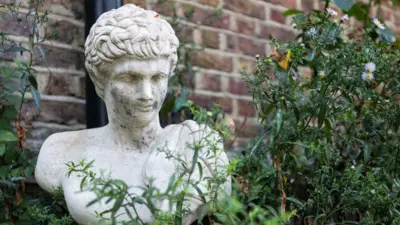We've updated our Privacy and Cookies Policy
We've made some important changes to our Privacy and Cookies Policy and we want you to know what this means for you and your data.
Charles Darwin: Notebooks lost for 20 years go on display in Cambridge
Image source, Cambridge University Library
Notebooks written by Charles Darwin, which were mysteriously returned to Cambridge University Library after going missing for 20 years, are going on public display.
They include his famous Tree of Life sketch exploring the evolutionary relationship between species.
The books were returned anonymously in April, in a pink gift bag.
The Darwin in Conversation exhibition opens at the University Library on Saturday.
The two postcard-sized notepads were left anonymously in a bag containing the original blue box the notebooks were kept in, and a plain brown envelope printed with the message: "Librarian, Happy Easter X."
Image source, Cambridge University Library
Image source, Cambridge University Library
The notebooks were last seen in November 2000 after a request was made for them to be removed from a special manuscripts storeroom to be photographed.
They were taken to a temporary studio but two months later the library discovered they were missing.
The notepads - valued at many millions of pounds - were returned, and are now being shown in public for the first time this century as part of the new exhibition.
There was no CCTV in the part of the library where the package was dropped, and it is still not known who took the books - or who returned them - but they had been well looked after, the library said.
Cambridgeshire Constabulary was involved in the case, but a spokeswoman said "the investigation has now been filed pending any fresh information coming to light".
Image source, Cambridge University Library
The new exhibition has been put together using the 15,000 letters Darwin wrote and received during his lifetime, the majority of which are housed at the University Library in the largest archive of Darwin-related material anywhere in the world.
Exhibition curator Dr Alison Pearn, associate director of the Darwin Correspondence Project, said: "Charles Darwin is one of the most famous names in science and through his letters we can all meet the man behind his world-changing ideas.
"Darwin's letters are often unexpectedly warm, witty and engaging.
"Whether encountered as a raw young adventurer, a family man, or a grey-bearded celebrity, Charles Darwin had an infectious curiosity about the world around him."
As well as the notebooks, other objects on display include Darwin's own first edition of "Origin of Species", the squeaky kidney beans which became a viral hit when a video of them being cleaned was released last year, and illustrated sketchbooks from the voyage of HMS Beagle.
Image source, Syndics of Cambridge University Library
Rare pages of Darwin's first draft of "Origin of Species" - kept only because they were reused by his children for drawing paper - are also going on display.
The Darwin Correspondence Project, based at the library, was established in the 1970s with staff working to transcribe and publish in print (and now digitally), every surviving letter that Charles Darwin wrote and received.
The 30th and final volume of correspondence will be published this year to coincide with the exhibition - marking the end of one of the largest and longest-running humanities projects anywhere in the world, the library said.
Image source, Cambridge University Library
Prof Jim Secord, the project director, said: "Letters were integral to Darwin's working day and specimens of plants and creatures were sent to Darwin from all over the world including butterfly wings from Brazil and feathers from southeast Asia.
"He spent an hour of every day reading them and an hour replying to his letters - some of it fan mail - using them as a research tool or pleas for help. He wrote in the margins, cut them up and pasted them in his own notes.
"Although Darwin is one of the most famous names in the history of science, this exhibition also shows how he was one voice among a vast worldwide web of conversations that helped propel scientific discovery during his lifetime."
The Darwin in Conversation exhibition runs from 9 July until 3 December at Cambridge University Library and will transfer to New York Public Library in 2023.
Find BBC News: East of England on Facebook, Instagram and Twitter. If you have a story suggestion email eastofenglandnews@bbc.co.uk
Top Stories
Features & Analysis
Most read
Content is not available








